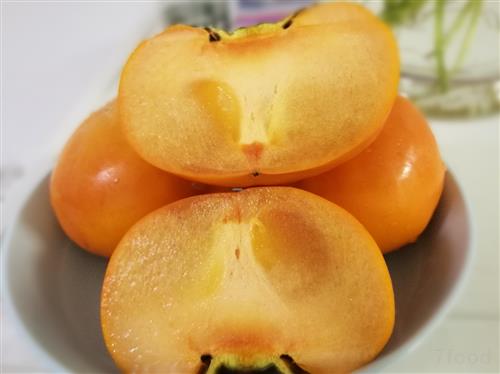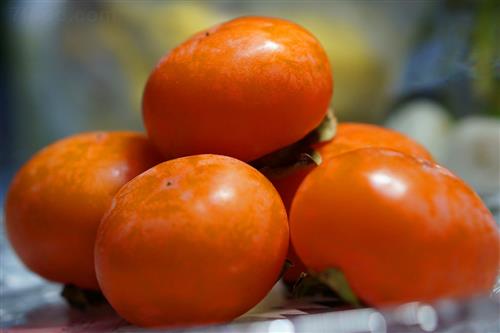Persimmon, also known as red persimmon, rice cracker, monkey date, Zhu Guo, Zhentou Jia, etc., is a fruit with thirst, heat and cooling effect, because of its high sugar content, sweetness ranks first in the fruit, Therefore, it has the reputation of "the sweetest gold fruit." October is the time when persimmons mature. There are two common types of persimmon on the market. One is the soft persimmon. The correct name is the sweet persimmon; the other is the crisp persimmon, and in some places it is called the lazy persimmon or the persimmon.
The difference between soft persimmon and crisp persimmon
Texture
The most direct difference between soft persimmons and crisp persimmons is that they do not have the same texture. The crisp persimmons are hard to touch, have a smooth surface and bright color. They are as large as small apples. Soft persimmons, as the name implies, can be known to be softer, naturally mature, with a red-orange color and a higher moisture content than crisp persimmons.
Taste
Crispy persimmons are as crisp as apples and pears. They taste crunchy and sweet, similar to apples, with a slight fruity taste, and no mouth-feeling after eating mouth; soft persimmons are sweet, juicy, and juicey. The feeling was that there was a hint of astringency in the mouth after eating.

How to eat
Crisp persimmons can be peeled and eaten directly with a knife; soft persimmons are more cumbersome to peel, and if they are not careful, they will be full of juice.
Tips: Soft persimmons can be eaten with thick straws. The soft persimmon is washed and gently kneaded. If the force is not uniform, it cannot be pinched. Turn off the persimmon and insert the straw into the mouth to suck it.
Mature way
Crispy persimmons need to be artificially removed from the astringent after picking before they can be marketed for sale; soft persimmons are naturally ripened or ripened and can be consumed without the need for astringent treatment.
Food groups
The crispy persimmon has a sweet and crisp texture, a hard texture, and no astringency. It is more suitable for young people to eat. The soft persimmon has a soft, juicy taste and is easily digestible. It is suitable for the elderly.
storage method
After fragile persimmons are removed from astringent, they need to be vacuum-preserved to avoid softening the mouthfeel. They are stored for a long time and are more suitable for buying and eating for many days. Soft persimmons are thin, juicy, very soft, easy to carry and store, and can be stored for a short time. .
nutrient content
Although the texture of soft persimmons and brittle persimmons is much different from the texture, there is no difference in nutrient composition. Soft persimmons are sweeter.
The nutritional value of hard persimmons
Persimmon has high nutritional value and is rich in sucrose, glucose, fructose, protein, carotene, vitamin C, citrulline, iodine, calcium, phosphorus, iron and zinc. It contains 1-2 times more vitamins and sugars than ordinary fruits. about. If a person eats a persimmon one day, the intake of vitamin C can basically meet half of the daily requirement. Therefore, eating persimmons is very beneficial to human health. Chinese medicine believes that it is slightly cold and astringent, and it belongs to the lungs and the large intestine. With lungs and phlegm, heat and fluid, astringent intestines only expectorant, spleen and stomach, fluid intestines, cooling blood to stop bleeding and other effects. However, the persimmon is cool and should be eaten less. Rich in carotene, riboflavin, vitamins and other trace elements.
Persimmon is rich in pectin. It is a water-soluble dietary fiber and has a good laxative effect. It is good for correcting constipation and maintaining normal intestinal flora growth. Physical workers eat large persimmons: It has anti-inflammatory and swelling effects, can improve blood circulation, promote tendon inflammation and recovery of trauma.

Hard fruit consumption
1. Supplemental Vitamin C: Hard persimmons contain 1 to 2 times more vitamins and sugars than normal fruits, so eating hard persimmons can supplement a lot of vitamin C.
2, laxative: hard persimmon is rich in pectin, it is a water-soluble dietary fiber, has a good laxative effect, for the relief of constipation, to maintain the normal growth of the intestinal flora has a very good effect .
The effect and function of hard persimmon
1, stop bleeding
Fresh persimmons have cooling blood to stop bleeding; persimmon moisturizes the lungs and can be used for throat dryness, mouth sores, etc.; Shidi has a counter-reduction effect; persimmons and stomach stop bleeding; persimmon leaves have hemostasis and are used to treat hemoptysis and hematochezia, Hemorrhage, vomiting blood, recent research found that persimmon and persimmon leaves have blood pressure, water, anti-inflammatory, hemostatic effect.
2, lungs and sputum thirst
Heat to dry, lungs and phlegm, soft, thirst, fluid, spleen, sputum, bleeding and other functions, can ease dry stool, hemorrhoids pain or bleeding, dry cough, sore throat, high blood pressure embolism.
3, blood pressure
Persimmon can help lower blood pressure, soften blood vessels, increase coronary flow, and can reduce blood flow and improve cardiovascular function.
4, hangover
Persimmon can promote the oxidation of alcohol in the blood, help the body excrete alcohol, reduce the harm of alcohol on the body.
Organic Spirulina powder is a biomass of cyanobacteria (blue-green algae) that can be consumed by humans and animals.Organic Spirulina used as a dietary supplement or whole food. It is also used as a feed supplement in the aquaculture, aquarium, and poultry industries.Dried spirulina powder contains 5% water, 24% carbohydrates, 8% fat, and about 60% proteinSpirulina powder, as nutrient-rich dietary supplement, supplies calories and is a rich source of numerous essential nutrients,particularly protein, B vitamins (thiamin, riboflavin, and niacin ), and dietary minerals, such as iron and manganese.Providing the fatty acids, gamma-linolenic acid, alpha-linolenic acid, linoleic acid, stearidonic acid, eicosapentaenoic acid (EPA), docosahexaenoic acid (DHA), and arachidonic acid.
Spirulina Powder,Organic Spirulina Powder,Pure Spirulina Powder,Organic Pure Spirulina Powder
XI'AN PLANT BIO-ENGINEERING CO.,LTD , https://www.plantbic.com